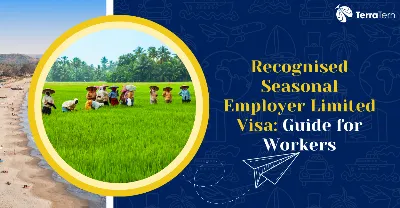Key Highlights
- What is a Recognised Seasonal Employer Limited Visa?
- How Does the RSE Scheme Work in 2025?
- Who Can Apply for a Recognised Seasonal Employer Limited Visa?
- What Are the Complete Application Requirements for the Recognised Seasonal Employer Limited Visa?
- How Long Does the Application Process for a Recognised Seasonal Employer Limited Visa Take?
- What Work Can You Do with a Recognised Seasonal Employer Limited Visa?
- What Are the Salary and Working Conditions for Recognised Seasonal Employer Limited Visa Workers?
- How to Find a Recognised Seasonal Employer?
- What Are the 2025 Industry Trends and Opportunities?
- Can You Switch Employers or Extend Your Stay?
- What Happens After Your Visa Expires?
- Conclusion
Recognised seasonal employer limited visa is a temporary working visa that enables Pacific Island nationals to provide employment services within the New Zealand horticulture and viticulture sectors up to 7 months within any 11-month season. This recognised seasonal employer limited visa program has been around since 2007, and with a 2024-2025 season limit of 20,750 employees -1,250 more than last year- has grown considerably since then.
The recognised seasonal employer limited visa offers unbelievable chances to Pacific Island workers in search of seasonal jobs in the New Zealand agricultural industry. The program provides guaranteed income, skills training and cultural exchange in addition to facilitating both the agricultural requirements of New Zealand and the economic development of the Pacific Islands. Essential benefits include:
-
NZD $23.15 per hour (NZD $25.47 to returning workers), guaranteed minimum wage.
-
Fruit, vegetable and wine seasonal work.
-
Opportunities in the development of skills and the experience of different cultures.
-
Faster application process with 80 percent processed in 2 weeks.
What is a Recognised Seasonal Employer Limited Visa?

Understanding the recognised seasonal employer limited visa begins with recognising its unique role within New Zealand's agricultural labour framework. This specialised work visa serves as a bridge between Pacific Island nations and New Zealand's seasonal agricultural needs, creating opportunities that benefit both workers and employers while addressing critical labour shortages. Key program features include:
-
Industry-specific employment in horticulture and viticulture only
-
Seasonal duration limited to 7 months in any 11-month period
-
Employer-tied authorisation requiring job offers from accredited RSE employers
-
Pacific Island nationality restriction ensuring a regional development focus
-
Guaranteed minimum wages and working conditions protections
-
Pastoral care obligation, ensuring worker welfare and support
Also Read: Unskilled Jobs in Germany for Foreigners: Latest Guide
How Does the RSE Scheme Work in 2025?
The identified seasonal employer limited visa is based on a complex three-level mechanism, which provides for quality control and protection of workers during the seasonal employment process. The system consists of government policy, employer accreditation and individual worker visa applications.
The recognised seasonal employer limited visa program has increased its capacity to employ 20,750 workers in 2025 by 6.4 per cent compared to the prior season. The growth is indicative of increasing demand within the New Zealand agricultural industry and awareness of the success of the program in satisfying labour requirements and development goals.
RSE Worker Cap and Allocation for 2024-2025 Season
The increased recognised seasonal employer limited visa quota of 20,750 is a wise step to fulfil agricultural industry needs and still retain the integrity of the program. This allocation is done by Immigration New Zealand using a complex system which takes into account the performance of the employer, regional requirements and the labour market conditions. The program is available to agricultural regions all over New Zealand through regional distribution:
-
Bay of Plenty: pick and pack Kiwifruits.
-
Hawke Country: Orchards and vineyards.
-
Marlborough: Grape vines.
-
Canterbury: farm vegetable processing and production.
Eligible Pacific Nations and Recruitment Process
The recognised seasonal employer limited visa maintains strict nationality requirements, limiting eligibility to citizens of participating Pacific Island nations. This targeted approach ensures the program serves its intended development objectives while maintaining manageable scale and quality standards. Eligible countries include:
-
Fiji - Largest participant nation
-
Samoa - Strong agricultural background
-
Tonga - Established recruitment networks
-
Vanuatu - Growing participation rates
-
Papua New Guinea - Emerging market
-
Kiribati - Special extension provisions
-
Nauru - Small but active participation
-
Solomon Islands - Increasing involvement
-
Tuvalu - Enhanced stay duration options
Who Can Apply for a Recognised Seasonal Employer Limited Visa?

The recognised seasonal employer limited visa has eligibility conditions and terms that aim to guarantee the safety of workers, the integrity of the program, and the effective success of employment. The interpretation of these needs allows prospective applicants to determine their fitness prior to commencing the application process.
The program aims to attract people capable of making a contribution to the rural sector in New Zealand and take advantage of the working position. Applicants who are successful exhibit physical competence to work in agriculture, good character records and adherence to the program.
Age and Nationality Requirements for Recognised Seasonal Employer Limited Visa
Minimum age requirements for the recognised seasonal employer limited visa ensure that workers possess sufficient physical and emotional maturity for seasonal agricultural employment. The 18-year minimum age reflects industry safety requirements and legal employment standards in New Zealand's agricultural sector. Age-related considerations include:
-
Physical fitness for agricultural work demands
-
Emotional maturity for overseas employment
-
Legal capacity for employment contracts
-
Safety awareness in agricultural environments
Health and Character Standards for Recognised Seasonal Employer Limited Visa
Recognised seasonal employer limited visa health requirements ensure workers are able to work safely and carry out agricultural work whilst safeguarding the public health in New Zealand. Medical tests should show that one is fit to do physical agricultural labour and does not have communicable diseases that can spread to the population.
-
The necessary health tests screen:
-
Physical fitness is in the heart.
-
Manual muscle health.
-
Outdoor working breathing.
-
General health conditions are within the New Zealand standards.
Also Read: Unskilled Jobs in Germany for Foreigners: Latest Guide
What Are the Complete Application Requirements for the Recognised Seasonal Employer Limited Visa?
The established seasonal employer restricted visa application procedure necessitates well-documented evidence of eligibility, employment conditions, and the ability to comply. Knowing all requirements will be processed smoothly and eliminate delays, which may influence the timing of seasonal employment.
Success in the application requires full and correct documentation that accurately reflects the eligibility and willingness to work seasonally in the agricultural labour market in New Zealand.
Required Documents and Fees for Recognised Seasonal Employer Limited Visa
Essential documentation for the recognised seasonal employer limited visa includes both personal identification materials and employment-specific documents. All documents must be current, authentic, and properly certified according to New Zealand immigration standards. Core documentation requirements:
-
Form INZ 1142 Application to Work for a Recognised Seasonal Employer
-
Current passport with a minimum of 6 months ' validity beyond the intended stay
-
Recent passport photographs meeting New Zealand specifications
-
Employment agreement with RSE-accredited employer
-
Medical certificates from approved medical practitioners
-
Police certificates demonstrating a clean character record
-
Evidence of return travel arrangements or sufficient funds
INZ 1142 Form Completion Guide
Accurate form completion is critical for application success, with specific attention required for employment details and supporting documentation alignment. Key completion steps:
-
Personal Details: Ensure exact passport name matching
-
Employment Information: Include specific RSE employer details
-
Health Declarations: Complete all medical history sections
-
Supporting Documents: Attach all required certificates
-
Declaration Signing: Must be completed in the applicant's presence
How Long Does the Application Process for a Recognised Seasonal Employer Limited Visa Take?

Planning your seasonal work schedule requires accurate knowledge of processing timeframes and factors that influence application approval speed.
Processing Timeframes:
-
Standard Applications: 80% processed within 2 weeks
-
Complex Cases: Up to 6 weeks for additional verification
-
Peak Season: Processing may extend during high-volume periods (October-December)
Factors Affecting Processing Speed:
-
Complete documentation submission
-
Health and police certificate validity
-
Employer RSE status verification
What Work Can You Do with a Recognised Seasonal Employer Limited Visa?
The scope of employment opportunities under the RSE scheme extends across diverse agricultural sectors, each offering unique seasonal experiences and skill development.
Horticulture Industry Opportunities
New Zealand's diverse fruit and vegetable production offers year-round seasonal opportunities across multiple regions and crop types. Primary activities include:
-
Fruit Production: Apple, kiwifruit, berry, and stone fruit operations
-
Vegetable Farming: Seasonal planting, cultivation, and harvesting
-
Crop Maintenance: Pruning, thinning, and pest management
-
Post-harvest: Packing, sorting, and quality control
Viticulture and Wine Industry Work
The prestigious wine industry provides unique cultural experiences alongside agricultural work in some of New Zealand's most scenic regions. Wine industry roles:
-
Grape Cultivation: Planting, pruning, and vineyard maintenance
-
Harvest Operations: Grape picking and initial processing
-
Winery Support: Basic cellar work and equipment maintenance
-
Seasonal Preparation: Vineyard setup and closure activities
Read More: 9 Best Jobs to Settle Abroad from India: Check Out
What Are the Salary and Working Conditions for Recognised Seasonal Employer Limited Visa Workers?

The known recognised seasonal employer limited visa scheme requires competitive payment and wholesome working conditions criteria. The minimum wage rates in 2025 are NZD $23.15 per hour for new workers and NZD $25.47 per hour for returning workers who have finished their third season or above.
Minimum Wage and Payment Guarantees
Other perks might be performance bonuses, transportation support and skills training opportunities. The deductions can be considered only the tax and accommodation (where needed) and agreed services such as meals or transportation.
-
Total of 240 hours of employment or 30 hours average per week.
-
Normal 8-hour shifts with overtime allowance.
-
Weekend and holiday premium rates according to the New Zealand employment law.
-
A health and safety appropriate working environment.
-
Proper protective equipment is supplied by employers.
-
Frequent rest and lunch breaks on the long shifts.
Accommodation and Pastoral Care Standards
Remuneration options could involve piece rate possibilities for the experienced workers, and hourly floor rates are ensured at all levels of productivity. Bonus systems are used to reward attendance, quality performance, and safety.
-
One day (240 hours) minimum employment with high income potential.
-
Average daily hours of 30 hours that offer income security.
-
Minimum payment i.e. weather protection in time of disruption.
-
Premium-based overtime payment for extra hours.
-
Productivity and quality performance incentives.
How to Find a Recognised Seasonal Employer?
It takes anthropomorphic research and application techniques to secure work with a Recognised Seasonal Employer Limited visa. Immigration New Zealand has an official employer database that gives a detailed listing of registered employers who are actively seeking seasonal employees. Some of the employer search techniques are:
-
Official INZ Employer Database: the main database of verified employers.
-
Labour Sending Unit coordination: LSUs coordinate employer relations and placement services.
-
The Networks of Industry Associations: the wine industry groups and Horticulture New Zealand.
-
Regional Development Agencies: Local organisations that encourage the use of seasonal employment.
-
Past Employee Recommendations: Suggestions by individuals who have attended a successful program.
What Are the 2025 Industry Trends and Opportunities?
The trends in the industry in the year 2025 indicate that sustainable farming and production using organic methods and the adoption of technology in the different horticultural industries within New Zealand will continue to grow. Adaptation strategies to climate bring new jobs in the diversification of crops and precision agriculture. New opportunities can be seen in:
-
Farming techniques and special training are to be sustainable.
-
High-end, high-cost organic production systems.
-
Introduction of technology, such as the use of GPS-guided equipment and data collection.
-
The value-added processing has gone beyond harvesting to product development.
-
Agri-tourism supplementation of seasonal employment in visitor services.
Also Read: New Zealand Makes Changes To Its Accredited Employer Work Visa (AEWV)
Can You Switch Employers or Extend Your Stay?
Switching employment is not permitted under the recognised seasonal employer limited visa program without formal approval and without continued authorisation. During the grace period of 21 days after the termination of employment, workers are allowed to change their employer, but only in case another accredited RSE is found. Change procedures include:
-
Immigration New Zealand notice of employment ending.
-
New employer arrangement during the 21-day period.
-
Application of variation of visa conditions where necessary.
-
Employer-to-employer accommodation transfer coordination.
-
Continuous pastoral care that provides continuity in the services.
What Happens After Your Visa Expires?
Visa expiry applications involve leaving New Zealand within the approved periods of stay. The implications of overstaying are direct liability to deportation and possible impediments to future visa applications of all types. In order to depart, you need:
-
Takes an exit with an approved time frame not allowed to extend past visa terms.
-
Departure operations require adequate exit papers at frontiers.
-
An excellent settlement of obligations settles all debts or legal matters.
-
Employer intimation of departure arrangements and final work arrangements.
-
Accommodation clearance that guarantees property return in addition to damage evaluation.
Conclusion
The recognised seasonal employer limited visa continues evolving as New Zealand's premier seasonal worker program, offering structured pathways for Pacific Island nationals while addressing critical agricultural labour needs. With enhanced protections, competitive wages, and expanded opportunities in 2025, this program represents a model for sustainable labour mobility and regional development partnerships.
For official application forms and the most current visa requirements, visit Immigration New Zealand's RSE visa page for authoritative government information. To know more about a visa, visit TerraTern now!






